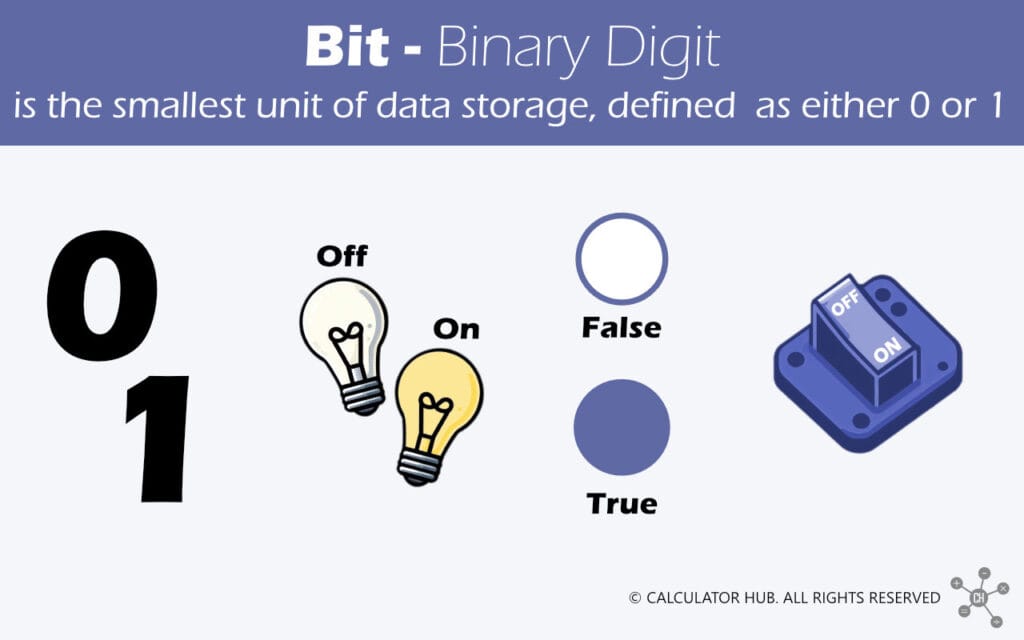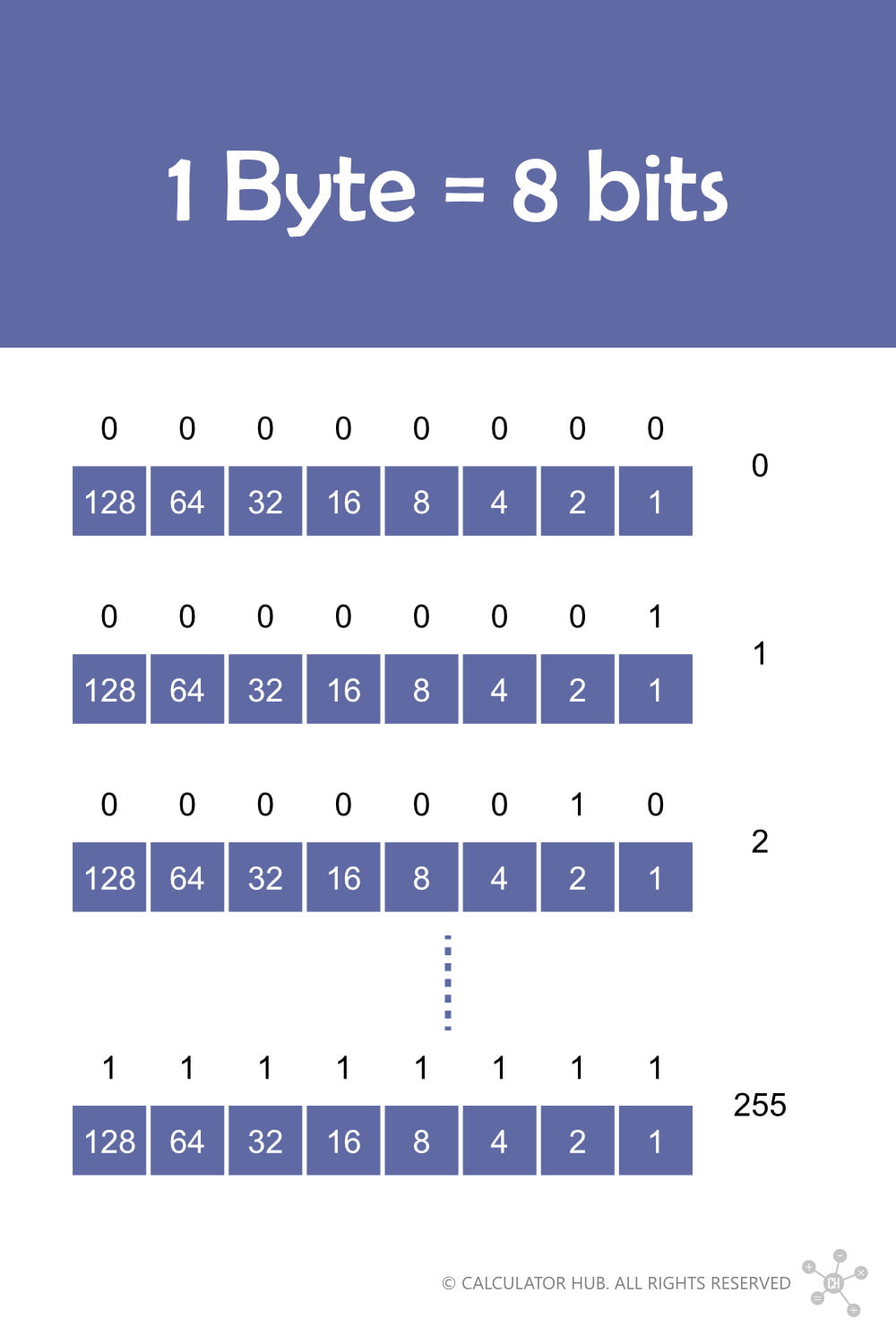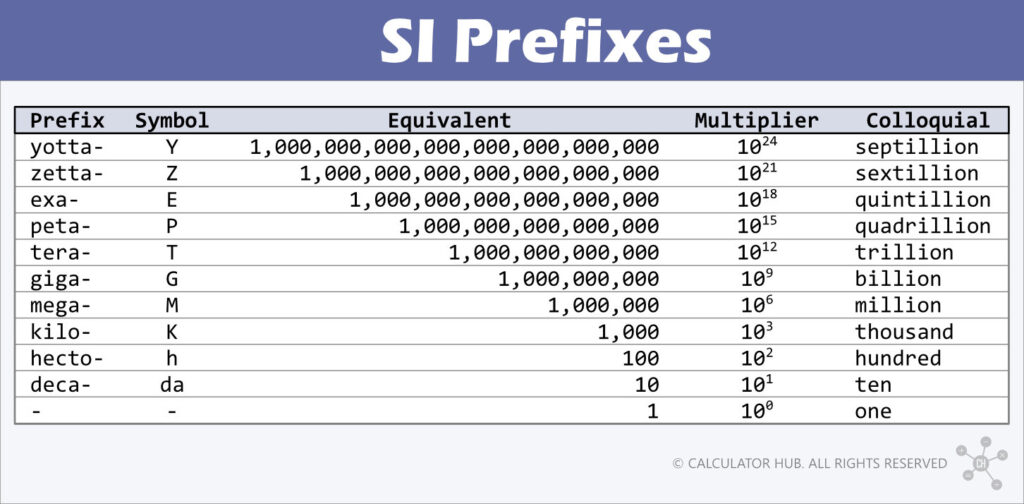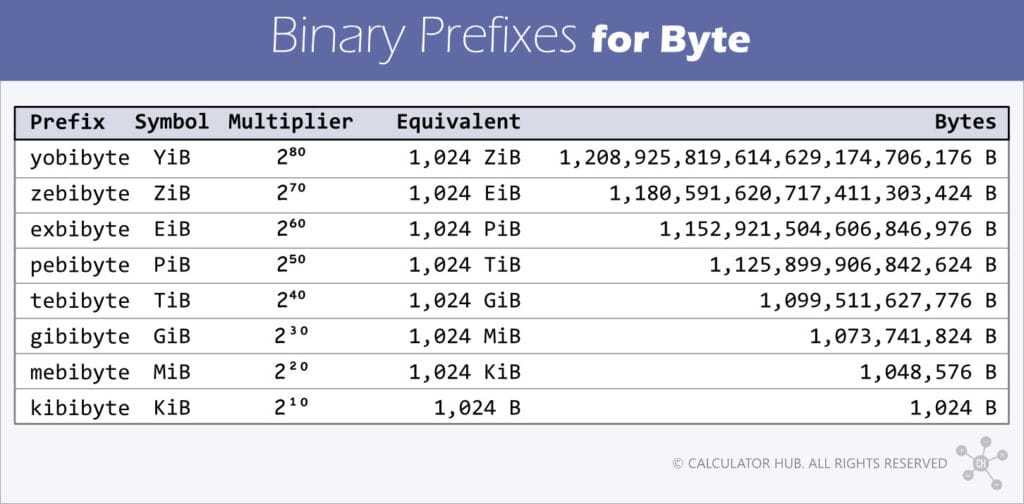
In this article, we’ll show you how to convert data from bits (b) to terabytes (TB). We will cover essential definitions, provide examples, share relevant formulas, and present tables, along with answers to common questions.
Definitions of Bit, Byte, and Terabyte
Let’s get started by understanding the key definitions and differences between bit, byte, and terabyte. Understanding these terms will allow you to perform conversions confidently.
What is bit?
A bit (b) is the smallest unit to measure data storage[1]. It can only represent two possible values: 0 or 1. It has symbols or abbreviations as b.

It is essentially a tiny switch that can be either off [0] or on [1]. It can represent a basic meaning such as true/false, yes/no, or on/off.
One bit equals 0.125 bytes (1b = 0.125 B).
What is Byte (B)?
A Byte (B) is a standard unit of digital information used for data storage. It consists of 8 bits, which gives it a total of 256 possible values (from 0 to 255).

It can represent a single character in the ASCII (American Standard Code for Information Interchange) encoding system.
So, storing a text file that contains 800 characters would take up data storage of approximately 800 bytes.
What is a Terabyte (TB)?
A terabyte (TB) is a unit of measurement for data storage used to measure hard drive capacity, files, or memory that are very large, typically between one trillion and one quadrillion bytes.
It has symbols or abbreviations such as TB, Tbyte, TiB, or Tibyte.

When using International System of Units (SI) prefixes[2], which are based on powers of 10, a terabyte (TB) equals 1,000,000,000,000 bytes.
1 TB = 1012 B = 1,000,000,000,000 B
When using International Electrotechnical Commission (IEC) binary prefixes[3], which are based on powers of 2, a terabyte (TB) equals 1,099,511,627,776 bytes.
1 TiB = 240 B = 1,099,511,627,776 B
Bit to Terabyte Formula
Let’s take a closer look at the conversion formula so you can carry out these conversions independently, whether you're using a calculator or doing it manually with pencil and paper.
Using Decimal (SI) Prefixes
The table below shows all the SI prefixes and the associated symbols, multipliers, and colloquials.

The tera- prefix in the International System of Units (SI) represents a multiplier of 1,000,000,000,000 (1012), while a byte equals 8 bits.
To convert bit (b) to terabyte (TB), divide the number of bits (Nb) by 8,000,000,000,000, since 1 terabyte equals 1,000,000,000,000 bytes or 8,000,000,000,000 bits.
NTB = Nb ÷ (8 × 1012) = Nb ÷ 8,000,000,000,000
Where:
- Nb represents the number of bits.
- NTB represents the number terabytes.
Using Binary (IEC) Prefixes
The IEC defined a set of binary prefixes to avoid confusion with the decimal-based SI prefixes. The table below shows all the binary prefixes, associated symbols, and their multipliers.

The tebi- prefix in the International Electrotechnical Commission (IEC) represents a multiplier of 1,099,511,627,776 (240).
To convert from bits to tebibytes (terabytes in binary system), divide the number of bits (Nb) by 8,796,093,022,208, since 1 tebibyte equals 1,099,511,627,776 bytes or (1,099,511,627,776 × 8) bits.
NTiB = Nb ÷ (8 × 240) = Nb ÷ 8,796,093,022,208
Where:
- Nb represents the number of bits.
- NTiB represents the number terabytes in binary system.
Examples
Now, let's take a look at an example that illustrates the calculations required to convert from bits to terabytes (b to TB)?
Example
Maria has a backup file stored on her computer that is exactly 9,600,000,000,000 bits. What is the size of the backup file in terabytes (TB)?
Solution 1: Decimal System
To calculate the actual file size in terabytes from bits using the decimal system, take 9,600,000,000,000 bits and divide it by 8,000,000,000,000 to find the file size in terabytes (TB).
Therefore, the backup file size of 9,600,000,000,000 bits equals 1.2 TB.
Solution 2: Binary System
To calculate the actual file size in terabytes from bits using the binary system, take 9,600,000,000,000 bits and divide it by 8,796,093,022,208 to find the file size in tebibytes (TiB).
Therefore, the backup file size of 9,600,000,000,000 bits is approximately 1.0914 TiB.
Bit to Terabyte Conversion Table
The conversion table below provides a handy reference for converting data storage capacity from bits (b) to terabytes (TB) in decimal and binary system. It covers a range from 0.1 b to 1,000 b, allowing for easy and quick conversions between these units of measurement.
| Bits | Terabytes (TB) | Tebibytes (TiB) |
|---|---|---|
| 0.1 bits | 0.0000000000000125 TB | 0.000000000000011368683772 TiB |
| 0.5 bits | 0.0000000000000625 TB | 0.000000000000056843418861 TiB |
| 1 bits | 0.000000000000125 TB | 0.000000000000113686837722 TiB |
| 2 bits | 0.00000000000025 TB | 0.000000000000227373675443 TiB |
| 3 bits | 0.000000000000375 TB | 0.000000000000341060513165 TiB |
| 4 bits | 0.0000000000005 TB | 0.000000000000454747350886 TiB |
| 5 bits | 0.000000000000625 TB | 0.000000000000568434188608 TiB |
| 6 bits | 0.00000000000075 TB | 0.00000000000068212102633 TiB |
| 7 bits | 0.000000000000875 TB | 0.000000000000795807864051 TiB |
| 8 bits | 0.000000000001 TB | 0.000000000000909494701773 TiB |
| 9 bits | 0.000000000001125 TB | 0.000000000001023181539495 TiB |
| 10 bits | 0.00000000000125 TB | 0.000000000001136868377216 TiB |
| 20 bits | 0.0000000000025 TB | 0.000000000002273736754432 TiB |
| 30 bits | 0.00000000000375 TB | 0.000000000003410605131648 TiB |
| 40 bits | 0.000000000005 TB | 0.000000000004547473508865 TiB |
| 50 bits | 0.00000000000625 TB | 0.000000000005684341886081 TiB |
| 60 bits | 0.0000000000075 TB | 0.000000000006821210263297 TiB |
| 70 bits | 0.00000000000875 TB | 0.000000000007958078640513 TiB |
| 80 bits | 0.00000000001 TB | 0.000000000009094947017729 TiB |
| 90 bits | 0.00000000001125 TB | 0.000000000010231815394945 TiB |
| 100 bits | 0.0000000000125 TB | 0.000000000011368683772162 TiB |
| 200 bits | 0.000000000025 TB | 0.000000000022737367544323 TiB |
| 300 bits | 0.0000000000375 TB | 0.000000000034106051316485 TiB |
| 400 bits | 0.00000000005 TB | 0.000000000045474735088646 TiB |
| 500 bits | 0.0000000000625 TB | 0.000000000056843418860808 TiB |
| 600 bits | 0.000000000075 TB | 0.00000000006821210263297 TiB |
| 700 bits | 0.0000000000875 TB | 0.000000000079580786405131 TiB |
| 800 bits | 0.0000000001 TB | 0.000000000090949470177293 TiB |
| 900 bits | 0.0000000001125 TB | 0.000000000102318153949454 TiB |
| 1000 bits | 0.000000000125 TB | 0.000000000113686837721616 TiB |
FAQs
How many TB is in a bit?
There is one eight-trillionth (1/8,000,000,000,000) of a terabyte, or 0.000000000000125 TB, in a bit when using the decimal system, where 1 terabyte (TB) equals 1,000,000,000,000 bytes.
In contrast, using the binary system, where 1 tebibyte (TiB) equals 1,099,511,627,776 bytes, one bit equals 1/8,796,093,022,208 of a tebibyte, or approximately 0.0000000000001137 TiB.
Here are the relationships between the data measurement units.
Decimal System
1 TB = 8×1012 = 8,000,000,000,000 b1 b = 1/8,000,000,000,000 TB1 b = 0.000000000000125 TB
Binary Sytem
1 TiB = 8×240 = 8,796,093,022,208 b1 b = 1/8,796,093,022,208 TiB1 b ≈ 0.0000000000001137 TiB
How to convert from bits to TB?
To convert a data storage from bits (b) to terabytes (TB), follow the simple steps below:
- Step 1: Write down the data storage value in bits (b).
Decimal System
- Step 2: Divide it by eight billion (
8,000,000,000,000or8×1012). - Step 3: The result is the value of the data storage in terabytes (TB).
Binary Sytem
- Step 2: Divide it by
8,796,093,022,208 (8×240). - Step 3: The result is the value of the data storage in tebibytes (TiB).
You now know how to convert data storage capacity from bits (b) to terabytes (TB) using both decimal and binary methods. You can quickly use our calculator to convert between data storage units, saving time for future calculations.
For further understanding, check our data storage converter page to learn more about the differences between decimal and binary units of data storage.

